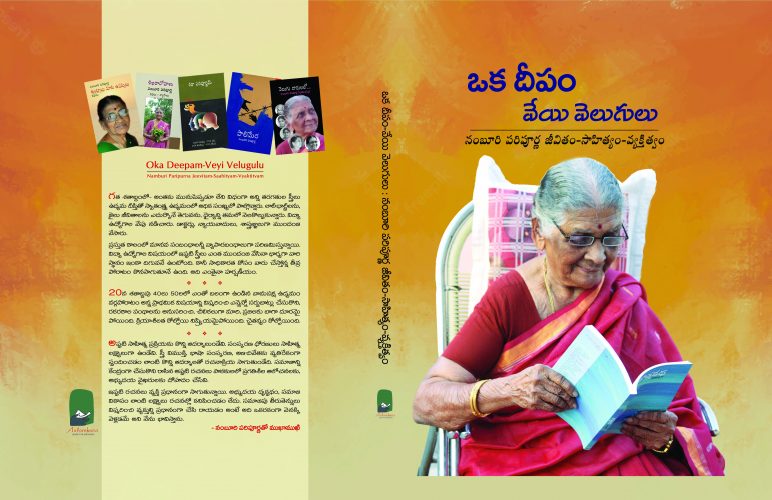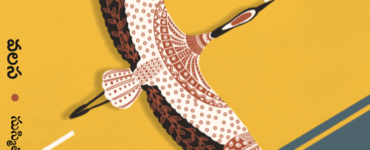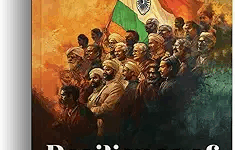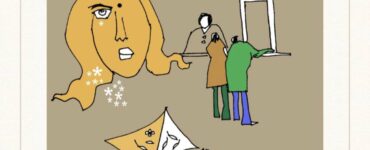Namburi Paripurna (b. 1931) is a well-known Telugu author and social activist. She has published several short stories, essays and two novels over the past five decades. Her autobiography “Velugu Daarulalo” was published in 2017. In what is perhaps a one-of-a-kind incident in Telugu literature, her son, Dasari Amarendra, an accomplished writer himself, is currently translating her autobiography into English. This essay is an excerpt from that upcoming translation, in which the author describes her life in early 1940s, and her family’s concerns about her continuing school education after a brief stint as a child artist in Telugu films. Although it is a personal story, the essay also depicts the Telugu social and cultural life of that time period, and many well-known Telugu people appear in Paripurna’s life story. Darisi Chenchayya, a prominent nationalist leader and social reformer of that era, played an important role in Paripurna’s life. This essay also gives us a glimpse of his personality.
-V.B. Sowmya
Chapter 2 – The Early Steps
Having been at home for six months without a proper engagement, I was more concerned about my studies rather than about the missed opportunities in the movie field. I dusted off my seventh standard text books and Wren & Martin grammar book and set out on self-study with great passion. I was doing the exercises given in Wren & Martin on a daily basis to grasp the nuances of English grammar. Sri Aroon Daya, a teacher in our village catholic school helped me to compose English sentences without grammatical errors.
Despite my ever-increasing concern, I found no way to continue my formal education. There was no chance of getting back to my hostel at Bezwada. High Schools were rarely seen in those days; only a few taluk headquarters had a high school. Gannavaram, one such taluk headquarter, is about 6-7 miles from our village. Travelling that distance every day was arduous. Even my parents were clueless about solving this problem.
I would like to recall a few incidents related to my elder brother, Srinivasa Rao.
When I was in my fifth standard at Vijayawada, he was an active worker of the Communist Party in the Amalapuram region of East Godavari district. As a consequence of his activities, he was arrested and sent to Rayavellore Central Jail. He was later shifted to Central Jails at Cuddalore and Rajahmundry and spent a total of seven years as a communist political prisoner till the conclusion of the Second World War.
That was the time when I had my cinema opportunities and experiences. While my brother was a detenue at Rayavellore and Cuddalore jails, he developed close friendship with Sri Darsi Chenchayya, another communist detenue. They became inseparable. My brother used to share every minute detail of our family with Chenchayya, without inhibition. In that process he mentioned to Sri Chenchayya about my work in the movies and my carelessness about a means to continue my studies. Sri Chenchayya was a kind-hearted person and a great social reformer. He understood our predicament. He decided to call me to Madras to help me in my studies. Upon release from the jail, he went back to Madras to settle down and after that helped me immensely in pursuance of my studies.
At this juncture, I would like to dwell upon Sri Chenchayya’s personality and his political life.
Sri Chenchayya belonged to the Kanigiri village of Nellore district. He was from a Vaishya family. He was one of the few scholars of that time who had higher education in the USA. He was an M.Sc. agriculture student in the decade 1910 at Berkeley University. He was attracted to the newly founded Gadar Party’s idea of armed struggle for India’s liberation. The Gadar Party was convinced beyond doubt that India’s independence could not be achieved by peaceful means and taking up arms against the white man’s rule is the only way to achieve it. Along with his party colleagues, Sri Chenchayya jumped into action to achieve that goal. Consequently, upon return to India, he was jailed for four years at various Central Jails across India as a C class prisoner. He was a man of courage, conviction and never lost his self-confidence despite spending prolonged periods in jail.
After his release, he joined as a Professor in the Agricultural College at the Annie Besant University, Madras. However, he couldn’t tolerate the mean criticism of Gandhiji and his freedom struggle by Annie Besant. He promptly resigned from his job.
Thereafter, during the period 1920-1935, he was deeply involved in the social reform activities and carried them out as if they were a movement in themselves. He took up major issues such as widow re-marriage and marriage of women belonging to the families of the world’s oldest profession. Despite facing enormous ridicule and insult he organised hundreds of such marriages to bring light into the lives of those women. Sri Veeresalingam and Sri Chilakamarti Lakshminarasimham, who were already engaged in that movement, inspired Sri Chenchayya with their activities and writings. Great reformers of that time such as Sri Unnava Lakshminarayana and Srimati Yamini Purnatilakam, who were epitomes of honesty and commitment, extended their fullest cooperation to Sri Chenchayya.
After being detached away from political activities after his years in the Gadar Party, Sri Chenchayya again became active in the political arena around 1935. He became an ardent Marxist and in turn, a committed communist. He built a comfortable residence at the corner of T Nagar-Alwarpet. With his commitment to Communist ideology, he soon evolved into a Trade Union leader of repute. His wife, Darsi Annapurnamma, who was extending her full support to his activities, departed rather suddenly. Srimati Subhadramma, a well-educated social worker, became his life partner thereafter. She looked after Lalita and Komala, the children deprived of their biological mother, with great care and discipline. Subhadramma felt that these children were her primary responsibility.
The Chenchayya-Subhadramma couple devoted their entire time for the trade union activities. Having embraced Marxism to the core, they were totally dedicated to the cause of common people.
This was the scenario, when I entered Sri Chenchayya’s house.
* * *
In the month of March 1943, following the discussions and decisions between my elder brother and Sri Chenchayya when they were together in jail, we received a message from Sri Chenchayya through the Communist Party Office at Vijayawada that I should be sent to Madras to continue my studies. He assured my parents that he would put me in a good hostel at Madras and would admit me in a good school. He advised that I may be sent to Madras all by myself rather than spending money on the accompanying adults. He suggested that a badge with the symbol of the party be pinned to my shoulder while boarding the train, which would enable him to recognise me at Madras railway station. The letter was so detailed and thoughtful that It was almost like a god-sent communication for all of us. My father, who was a teacher and an ardent believer in education, was extremely keen on continuation of my education. He was bold and courageous by nature. Yet he as well as my mother were slightly hesitant to send a girl of twelve to Madras, all alone. Srimati Chandra Savitramma, who was a Party senior and a well-wisher of my family, allayed their fears and infused confidence in my parents. Sri Chandra Rajeswara Rao equipped me with suitable clothing. As suggested by Sri Chenchayya, my mother accompanied me up to Vijayawada and put me on the Madras Mail. In those days, a third class ticket to Madras costed just five rupees! Having recently been at Madras for a long time for my movie assignment, I was not unduly concerned about going to Madras alone.
As planned, Sri Chenchayya was at the Central Station and immediately recognised me by the party symbol pinned on my shoulder. On reaching home, Srimati Subhadramma welcomed me with an affectionate hug. Lalita, a little elder to me and Komala who is of my age warmly greeted me and took care of my immediate needs and helped me have dinner.
After a couple of days, I was admitted into the hostel attached to a high school named ‘Seva sadan’ in Chetpat area of the city. Lady Rama Rao, a well-known woman of the city, was the founder principal of that school. During her association with Sri Chenchayya in the widow-remarriage activities, she got in touch with another well-educated gentleman Sri Rama Rao and married him. Out of deep respect and gratitude for Sri Chenchayya, Lady Rama Rao admitted me into the hostel immediately as a free-boarder. However, the three days I spent there were like hell. The rooms in the first floor of the hostel building were allotted to the children from rich families who could afford to pay rent and mess charges. Food was served right in their rooms. Free-boarders like me were all accommodated in a big hall on the ground floor. The free-boarders were to have their meals in the open space adjacent to the kitchen. Harijan boys and girls belonging to rural Tamilnadu constituted bulk of the free-boarders. Harijan girls were made to work in the kitchen. Having known that I belonged to their community, those girls were very affectionate towards me.
I entered the hostel without knowing the need of owning a plate. Having realised this, the elder girls, who were in-charge of the kitchen, placed rice balls soaked in sambar, in my palms to eat. I was rather embarrassed. Another aspect of the hostel pained me and caused a sense of insult. All of us free boarders were to wake up quite early in the morning as we were assigned with the job of cleaning the school premises and rooms of the paid students on the first floor.
In no time, I could clearly sense the systematic discrimination being followed by the school administration– based on the boarders’ economic and social background. It was beyond me to tolerate. I decided to leave the place then and there. Under the pretext of collecting my clothes from Sri Chenchayya’s place, I got permission to go there.
On reaching home, I shared my experiences at the hostel with Sri Chenchayya and Srimati Subhadramma. Till then, they were not aware that such a discrimination was going on in the hostel and were pained to know about it.
I insisted that I wouldn’t return to Sevasadan. I requested them to send me back to my native place and assured them that I would continue my studies at the Gannavaram high school, though it involved a long daily trek.
Sri Chenchayya sent for Lady Rama Rao the next day and enquired about the issues I had spoken about. She accepted that they were all facts. She expressed her inability to change the rules, yet assured that she will take extra care of me after my return. I adamantly opposed the idea of my return to Sevasadan. To break the stalemate, Sri Chenchayya decided to keep me at their house, so that I can continue to study at Madras. He arranged to admit me in the Sarada Girls High School, being run by the Ramakrishna Mission, beside Panagal Park at T Nagar.
That was the admission time after summer vacation. The school had a system of conducting an admission test. Sri Chenchayya took the responsibility of coaching me for the entrance exam, particularly in English. That was a test for entry into the eighth standard. Though I studied only up to fifth standard by then, we decided to attempt the test for the eighth standard. Thanks to Sri Chenchayya’s coaching I cleared the test.
As I was very passionate right from the beginning I started focussing on my studies with great intent. Though I got good marks in all subjects in the quarterly exams, I secured only 32% in English and failed. I took it as a challenge and tried relentlessly to gain a hold over English. Those efforts bore fruit and I secured 55% marks in the half-early exams. By the end of the year, my studies progressed unbelievably well I secured first marks in all subjects and the first rank overall.
Besides enabling me to continue my studies, my stay at Madras opened an opportunity to take part in a few cultural and music programmes. I had a natural flair for singing. My sojourn in the movie industry helped me in refining and regulating my singing abilities. Encouraged by my teachers, I regularly rendered the prayer song at the school assembly. Our Sarada Vidyalaya had a special feature in its calendar: it organised various cultural programmes during the weekends, in which students from all classes took part..
Sri Seshacharyulu, our Telugu pandit, was very affectionate towards me. He had full confidence in my abilities. Apart from the prayer songs and the national songs in the assemblies, he used to offer me key roles in the humorous playlets penned by him, based on incidents from mythology. All these aspects made me popular in school. Not only my classmates in my section, Tamil students from other sections and even those in higher classes started liking me.
In every class, Section A was earmarked for Telugu students; Sections B to F were for Tamil students. Neither I knew Tamil, nor they knew Telugu. However, we used to converse in English and they were very friendly and affectionate during those conversations. This is one of the sweet memories of Sarada Vidyalaya I cherish.
* * *
A radio station was established about four years before my second innings at Madras. Sri Kottapalli Veerabhadra Rao, the Station Director and Sri Chenchayya were good friends. Sri Chenchayya took me over to the radio station at Egmore one day and introduced me to the Station Director. He briefed the director about my foray into the movie world. Sri Chechayya took further initiative and requested Sri Veerabhadra Rao to give me an opportunity to sing for the radio. Sri Veerabhadra Rao asked me to sing a couple of songs. Having liked the way I rendered the songs, Sri Rao promised us to give an opportunity to sing for the radio.
Such opportunities were offered in the form of formal radio contracts. True to his word, Sri Rao ensured that I got a couple of contracts a month to sing. Sri Balantrapu Rajanikanta Rao was the Programme Executive of the Telugu section in those days. Sri Achanta Janaki Ram was one of the founders of the radio station at Madras. Sri Rajanikanta Rao was a great lyricist, playwright and a prodigious composer of music. In addition he was penning excellent patriotic songs – for broadcast during the national days. Sri Rajanikanta Rao was in charge of imparting training to all of us for the radio plays and other programmes. For a thirteen year old, I was fortunate to be picked by him to play the key roles in all those plays.
A week before the broadcast of such plays, I used to reach the radio station for rehearsals – directly after our school hours. I had a great opportunity of being with Sri Rajanikanta Rao for long hours during the rehearsals, which he was organising with great care and dedication. By the time I gave my annual exams in 1943, I already performed key roles in half a dozen radio plays, of which I can recall only three titles now: Vasakasajjika, Chitrakutam and Prahlada Yakshaganam. The artform of Yakshagana, being part of the Kuchipudi style of dance, Sri Vedantam Raghavayya, an exponent of that style, took the lead in the broadcast of Prahlada Yakshagana. After a decade, Sri Raghavayya became a household name on directing the unforgettably tragic movie, Devadas. He gained great name and fame as director of folklore movies. Stalwarts such as Sri Jalasutram Rukmininatha Sastry and Sri Prayaga Narasimha Sastry were assisting Sri Rajani and Sri Janaki Ram in producing the plays and other programmes for the radio.
Sri Mallik, Srimati Radio Bhanumati and two others – popularly known by the name Vijayawada sisters (it is unfortunate that I don’t remember their names) were regulars in all our radio plays. We used to perform all the plays with great team spirit. We bonded like a family with mutual affection.
We were getting a remuneration of 15 rupees per programme in those days. For that year, I garnered a grand total of Rs 150. Sri Chenchayya and Srimati Subhadramma earmarked that entire money for spending on me. They purchased good new clothes for me from that earning. They were actually a godfather and a godmother for me and the love and affection they showered on me was unparalleled.
* * *
I would like to narrate details of another opportunity I got during my 1943-44 days at Madras. In those days (perhaps even now) the Telugu residents of Madras used to have ‘Andhra Week Celebrations’ every year. That was a period full of programmes related to Telugu culture. The programmes included critical analysis of modern and mythological works of the Telugu literary stalwarts. They were minutely analysed and explained to the audience by experts in the field. Intense discussions related to Telugu history and culture were a part of the programme. Poets and literary experts – belonging to different schools of thought – used to join these week-long celebrations with great enthusiasm, and deliver enlightening talks.
That year, in the month of December 1943, as a precursor to the week-long celebrations, the organisers conducted various competitions related to academics for the high school and college students of the city. These competitions were held in the Gokhale Hall under the auspices of a special committee. The events for competitions included essay writing, elocution, classical and light music.
Sri Seshacharyulu used to accompany the students of our school for those competitions. I took part in all the events and secured the first place in essay writing, elocution and light music.
After conclusion of these competitions, the week-long celebrations commenced. I was fortunate to be present during the discussions on various topics such as history of Telugu land, the evolution of Telugu language, the special features of Telugu literature and the role being played by the Andhra litterateurs in the ongoing freedom struggle. That year they kept a whole day aside for musical performances. Musicians from the radio and the movie field took part in the programme. Stalwarts such as Sri Rajanikanta Rao, Saluri Rajeswara Rao, Tanguturi Suryakumari, Rao Balasarasvati, S Varalakshmi and Radio Bhanumati enthralled the audiences with their excellent talent and expertise in music.
Stalwarts and scholars such as Sri Vishwanatha Satyanaraya, Tenneti Vishwanaatham, Joshua, Achanta Janaki Ram, Jaruk Sastri and SriSri took part in the literary programmes that year. My memory is still very fresh with that great experience of listening to those stalwarts.
Sri Joshua presided over the closing session of the week-long programme. Once again, I was given an opportunity to render a patriotic composition as a prayer song. At the end of the meeting prizes were distributed by Sri Joshua to the winners of various competitions. Having seen me receiving the first prize thrice, he smiled affectionately and said, “you seem to be taking away all the prizes, my child,”. I smiled and greeted him with a namaste.
* * *
After a couple of days, Sri Chenchayya received a message from Joshua, that Joshua wants to meet me. Sri Chenchayya sent a person to accompany me to Joshua’s place at Kodambakkam. Joshua cordially received me and told about the reason for our meeting.
“Paripurna! I observed you in the meeting held day-before-yesterday. I felt that you are a person with great initiative and drive. Your rendering of the prayer song was very competent and melodious. We need your help now. Let me explain.
“As you know, we are deeply involved in the second world war right now. Our government has set up a National War Front project in this background and I am the Regional Director of the Project, operating from Madras. I am sure you are aware that the war has been raging on for the last four years. Hitler, the dictator of Germany has ambitions to rule the entire world with his Nazi forces. Right now he is engaged in the annihilation of thousands of people in a barbaric way. It is time for us to save our country from his invasion. The National War Front is tasked with the responsibility of enlightening our people to take an active role in the ongoing war, if needed. I am composing patriotic and inspirational songs to motivate people for the same. I have a set of singers who are going from village to village to spread this message. I would like you to join my group of singers and participate in motivating people around. I am of the opinion that your participation in the team would enhance the impact.
“You will be finishing your annual exams soon and will have a two-month summer vacation. I suggest that you join our team during those two months. You will get a remuneration of Rs. 100 per month. That amount would help you a lot in your future studies. I hope that this would be acceptable to you.” He explained in detail and sought my consent.
I was not convinced with what he said.
In my assessment, it was a war being waged by imperialist governments of Britain, France and America to gain control over the entire world. Why should anybody give a helping hand for such a sinister plan? What does India gain by helping those masters? These were the questions clouding my mind. I thought for a while, cleared up my mind and answered –
“You have to excuse me sir. I am not convinced about the whole plan. Instead of lending a helping hand to the imperialist forces, should we not utilise this opportunity and to intensify our freedom movement and thus gain independence soon?” I asked.
He was perplexed. “Paripurna! Please understand that Hitler is a fascist dictator, and a very cruel one at that. He has already swallowed a big chunk of Europe. He would soon invade India too and destroy it. It is imperative for us to give a helping hand to the Allied Forces so that they can win over the fascist forces and save the entire world. You may be too young to understand these complexities. I suggest that you leave those matters aside. If you opt to work with us for some time, I will have an opportunity to help you in your literary pursuits. Who knows? You may become another Kummari Molla! I will surely be able to help you achieve that!”
Hearing him saying so, I felt like explaining my stand further. “Sir! Who are the people responsible for this world war? Who initiated this war? Is it not the imperial forces that encouraged Hitler with an intention to weaken Soviet Russia, and made him a hero and a warmonger? It is true that now he has become too big a monster for the Allied Forces to subdue. As you said, he swallowed a big chunk of Europe and now, he is in the process of waging a war against Russia. Of course, he is getting badly hit in his present attempts against Russia. But for the Russian Red Army, which has been resisting valiantly all his advances, the entire world would have been crushed by him by now.
“Sir, kindly don’t think I am explaining something which you do not know. These evil imperial forces have realised the valour of the Red Army after innumerable bitter experiences. They joined hands with Stalin now and formed the Allied Forces out of their dire necessity. Aren’t they responsible for the annihilation of millions of Jews and others at the hands of the Nazi forces? Did they venture into the war for our benefit? Why should we help them now?
Sri Joshua had a hearty laugh and was about to say something. I interrupted him and said, “Sir, to be frank, I am surprised that you are working for a National War Front project. I somehow do not like it.”
“Look Paripurna! I am rather helpless. I have a large family. I am working as a Telugu Pandit in a high school at Vinukonda and receiving a monthly salary of Rs 100. That is grossly inadequate to support my family. I am now getting a monthly remuneration of Rs 400 for this assignment. In addition, I have a spacious accommodation for free. I am provided with a car and a jeep to carry out my activities.
“I now have a bit of financial stability. Still, I am not indulging in praise of white rulers either in my writings or in this present publicity activity. I am only highlighting the valour of Indians and the need to save our country and the world from the Nazi forces. I am penning patriotic songs for the purpose, which are being used to publicise this point. But tell me one thing, how did you acquire such a deep understanding of the current world politics at this tender age?”
“Sir, ours is a family of freedom fighters! My elder brother, Srinivasa Rao is a staunch Communist. It is he who made our entire family conscious of the conspiracies being hatched by the white rulers to exploit India and keep it under perpetual slavery. Sri Darsi Chenchayya, under whose patronage I am continuing my studies, also explains the day-to-day political developments to us. In addition, we regularly follow newspapers.”
“Paripurna! I will not force you to do something about which you are not convinced. I want you to study hard and excel in your life!”
With that, he saw me off affectionately.
* * *









welcome edition of English translation of paripurna’s autobiography from Telugu. Congrats Amarendra garu.
నంబూరి పరిపూర్ణ గారి పుట్టినరోజు జూలై 1. ఆ సందర్భంగా ఆమె సాహిత్య జీవిత వ్యక్తిత్వాల్ని మూల్యాంకనం చేస్తూ వెలువరిస్తున్న పుస్తకం “ఒక దీపం – వేయి వెలుగులు”. వంద మందికి పైగా రచయితల రచనలతో ఈ అభినందన సంచిక ఆగస్ట్ 27 న విడుదల కానుంది.
పరిపూర్ణ ఆత్మకథ ‘వెలుగు దారుల్లో’ ని ఆమె కుమారుడు దాసరి అమరేంద్ర ఇంగ్లీషు లోకి అనువాదం చేశారు. ఇది అచ్చులో ఉంది.
ఇంతకు ముందు కొండపల్లి కోటేశ్వరమ్మ గారి గురించి ఎన్నో ఆర్టికల్స్ ప్రచురించిన ‘సారంగ’ పరిపూర్ణ గారి పై కూడా ప్రత్యేక శ్రద్ధ పెడుతున్నందుకు అభినందనలు, ధన్యవాదాలు.
Thank you Sarangaa